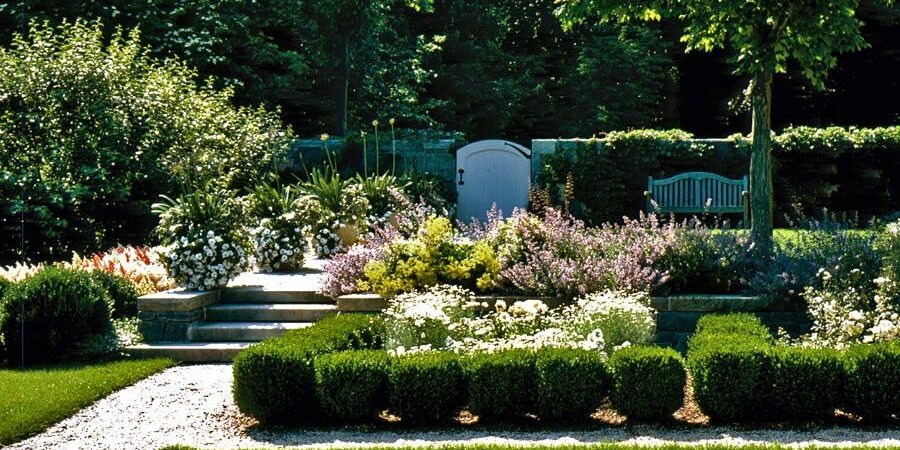Most estate properties employ a small crew in-house to do the everyday maintenance and care for the grounds. When it comes to big projects or specialty services, however, it may be necessary to outsource landscape needs. Some may choose to outsource landscaping to a service, or multiple services, to take that off their staff responsibilities completely. From concept to maintenance, there are several types of specialists and services an Estate Manager might consider:
Landscape Architects plan and design your landscape. They focus on the topography, conditions and aesthetic layout of the gardens and grounds. Landscape architects provide a blueprint for the physical layout of the space, and may choose the significant trees, hedges, water features, and structural elements.
Landscape Designers work with the landscape architect to design the grounds. The landscape designer focuses on plant materials, beds, pots, and seasonal performance of the garden. A Landscape designer may also suggest ornamental features and will design your irrigation and maintenance plans.
Landscape Contractors install the landscape features, including the softscapes, like soil and vegetation, and hardscapes, like fences, water elements, stones, and walkways. They may also provide ongoing service and maintenance.
Horticulturists are plant experts. If your plants aren’t flourishing, your leaves are being eaten by pests, or you live in a particularly difficult climate for vegetation, you may want to work with a horticulturist. They can also coordinate with landscape architects or designers to plan your gardens.
Arborists plant, prune, remove, and take care of trees. They know about fertilization and nutritional needs, as well as cabling, bracing, and support for newly planted trees. Make sure your arborist is certified by the International Society of Arboriculture.
There are a lot of services out there, so it pays to thoroughly vet your chosen contractors. There are some key things to look for:
A solid reputation: Online customer reviews are usually a strong indication of what to expect from a landscaper. You can also check the Better Business Bureau for any complaints. Another way to find a company that might work for you is to look for neighboring yards you admire. Ask the homeowners which company they hired for design or construction.
A strong portfolio: Take a look at a company’s past work, which is often showcased on its website. Keep in mind that every picture will likely look great, as smart companies won’t post pictures of mediocre work. Look for companies that showcase properties similar to yours in size and scope to be sure they can handle the job.
Specialization: Many landscaping companies have teams of people to help with your project. Do you want to hire for each task separately, or do you want a firm that can handle everything? The latter is easier to deal with because the members of your landscape team can work together.
A compatible vision: This isn’t something you’ll find on paper, but you’ll want to work with a landscaper who ‘gets’ what you’re trying to accomplish. Spend some time with your potential contractor, and make sure they’re offering the level of service and experience you’re looking for. A contractor should come across as professional, knowledgeable, and reliable.
Certifications: It’s a good idea to check your contractor’s certifications if you can. Certifications will vary significantly depending on which type of professional you’re hiring, but are important for any professional landscaping project that involves construction or changes to the topography of your site. Below, you’ll find the major associations, degrees, and licenses associated with each type of landscaping professional.
- CLARB Certification: This is an authority in landscape architecture. A professional can apply for the Landscape Architect Registration Examination (L.A.R.E.) through this board; this test is a prerequisite for certification in most states.
- American Society of Landscape Architects: Don’t be confused by the letters after an architect’s name. PLA (Professional Landscape Architect), LLA (Licensed Landscape Architect), RLA (Registered Landscape Architect), or just LA (Landscape Architect) are all acceptable. ASLA asks its members to use PLA, but instead of relying on the jumble of letters, ask any potential landscape designers to spell out their certifications for you. You can also use the ASLA tool to search for certified designers.
- Bachelor of Landscape Architecture (BLA or BSLA): One of these bachelor’s programs is usually required for entry into the profession. Alternatively, a professional may study something different as an undergraduate, but receive a master’s degree in landscape architecture (MLA). If you want to be especially thorough, make sure the program is accredited by the American Society of Landscape Architects.
- Association of Professional Landscape Designers: This association offers the only certification for landscape design in the United States. Don’t just ask if a landscape designer is a member of the association; confirm if they are certified. Only 20% of APLD members have received the certification.
- Landscape Contractor Licenses: Most states require a license for landscape contractors. However, the requirements vary, and there is no uniform license all contractors are required to obtain. Make sure whatever contractor you choose is licensed in your state.
- National Association of Landscape Professionals: This organization is the largest national trade association of lawn care and landscape professionals. It includes many kinds of landscapers, including architects and designers. Any firm or individual can join, so look for members who have won an Award of Excellence or passed the certification exams.
- International Society of Arboriculture: The ISA is the leading authority of arboriculture, with more than 20,000 members globally. All members must pass an exam to join, and renew their certification every three years. The ISA also administers the only international credentials program in the arboriculture industry.
- National Arborists Association: This association for commercial tree care services firms has high standards for arboricultural techniques. Certified members must pass an examination and are committed to continued education.
There are many reasons to outsource landscaping tasks; most notably that your estate grounds are a constant work in progress requiring specialized expertise and a lot of time. With a little research and proper due diligence, you can put together an excellent contract landscape team that will keep your grounds in top shape for seasons to come.
Landscape Architects plan and design your landscape. They focus on the topography, conditions and aesthetic layout of the gardens and grounds. Landscape architects provide a blueprint for the physical layout of the space, and may choose the significant trees, hedges, water features, and structural elements.
Landscape Designers work with the landscape architect to design the grounds. The landscape designer focuses on plant materials, beds, pots, and seasonal performance of the garden. A Landscape designer may also suggest ornamental features and will design your irrigation and maintenance plans.
Landscape Contractors install the landscape features, including the softscapes, like soil and vegetation, and hardscapes, like fences, water elements, stones, and walkways. They may also provide ongoing service and maintenance.
Horticulturists are plant experts. If your plants aren’t flourishing, your leaves are being eaten by pests, or you live in a particularly difficult climate for vegetation, you may want to work with a horticulturist. They can also coordinate with landscape architects or designers to plan your gardens.
Arborists plant, prune, remove, and take care of trees. They know about fertilization and nutritional needs, as well as cabling, bracing, and support for newly planted trees. Make sure your arborist is certified by the International Society of Arboriculture.
There are a lot of services out there, so it pays to thoroughly vet your chosen contractors. There are some key things to look for:
A solid reputation: Online customer reviews are usually a strong indication of what to expect from a landscaper. You can also check the Better Business Bureau for any complaints. Another way to find a company that might work for you is to look for neighboring yards you admire. Ask the homeowners which company they hired for design or construction.
A strong portfolio: Take a look at a company’s past work, which is often showcased on its website. Keep in mind that every picture will likely look great, as smart companies won’t post pictures of mediocre work. Look for companies that showcase properties similar to yours in size and scope to be sure they can handle the job.
Specialization: Many landscaping companies have teams of people to help with your project. Do you want to hire for each task separately, or do you want a firm that can handle everything? The latter is easier to deal with because the members of your landscape team can work together.
A compatible vision: This isn’t something you’ll find on paper, but you’ll want to work with a landscaper who ‘gets’ what you’re trying to accomplish. Spend some time with your potential contractor, and make sure they’re offering the level of service and experience you’re looking for. A contractor should come across as professional, knowledgeable, and reliable.
Certifications: It’s a good idea to check your contractor’s certifications if you can. Certifications will vary significantly depending on which type of professional you’re hiring, but are important for any professional landscaping project that involves construction or changes to the topography of your site. Below, you’ll find the major associations, degrees, and licenses associated with each type of landscaping professional.
- CLARB Certification: This is an authority in landscape architecture. A professional can apply for the Landscape Architect Registration Examination (L.A.R.E.) through this board; this test is a prerequisite for certification in most states.
- American Society of Landscape Architects: Don’t be confused by the letters after an architect’s name. PLA (Professional Landscape Architect), LLA (Licensed Landscape Architect), RLA (Registered Landscape Architect), or just LA (Landscape Architect) are all acceptable. ASLA asks its members to use PLA, but instead of relying on the jumble of letters, ask any potential landscape designers to spell out their certifications for you. You can also use the ASLA tool to search for certified designers.
- Bachelor of Landscape Architecture (BLA or BSLA): One of these bachelor’s programs is usually required for entry into the profession. Alternatively, a professional may study something different as an undergraduate, but receive a master’s degree in landscape architecture (MLA). If you want to be especially thorough, make sure the program is accredited by the American Society of Landscape Architects.
- Association of Professional Landscape Designers: This association offers the only certification for landscape design in the United States. Don’t just ask if a landscape designer is a member of the association; confirm if they are certified. Only 20% of APLD members have received the certification.
- Landscape Contractor Licenses: Most states require a license for landscape contractors. However, the requirements vary, and there is no uniform license all contractors are required to obtain. Make sure whatever contractor you choose is licensed in your state.
- National Association of Landscape Professionals: This organization is the largest national trade association of lawn care and landscape professionals. It includes many kinds of landscapers, including architects and designers. Any firm or individual can join, so look for members who have won an Award of Excellence or passed the certification exams.
- International Society of Arboriculture: The ISA is the leading authority of arboriculture, with more than 20,000 members globally. All members must pass an exam to join, and renew their certification every three years. The ISA also administers the only international credentials program in the arboriculture industry.
- National Arborists Association: This association for commercial tree care services firms has high standards for arboricultural techniques. Certified members must pass an examination and are committed to continued education.
There are many reasons to outsource landscaping tasks; most notably that your estate grounds are a constant work in progress requiring specialized expertise and a lot of time. With a little research and proper due diligence, you can put together an excellent contract landscape team that will keep your grounds in top shape for seasons to come.



